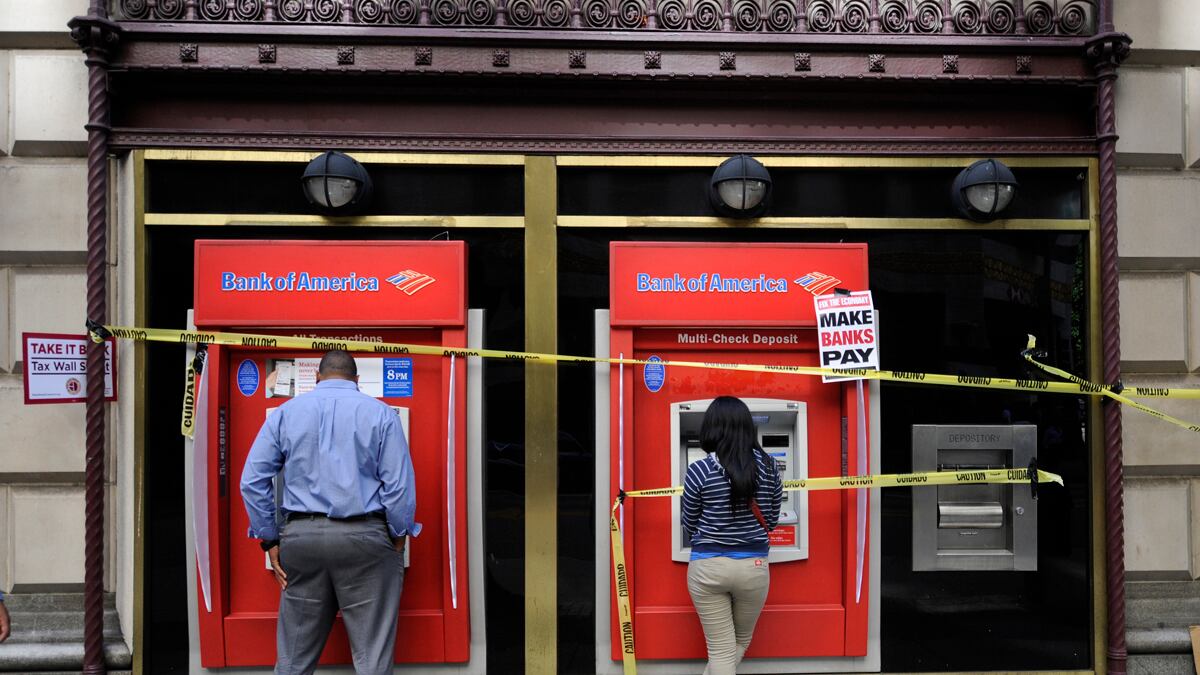Kristen Christian was feeling more than a little fed up with the county’s big banks when a month ago today she logged on to Facebook to share an idea with friends: withdraw your money from the likes of Bank of America and JPMorgan Chase, and instead open an account with a credit union. She even chose a deadline for taking action: this Saturday, Nov. 5.
“Together we can ensure that these banking institutions will always remember the 5th of November,” Christian, then a 27-year-old art-gallery owner living in Los Angeles, wrote on Facebook. “If we shift our funds from the for-profit banking institutions in favor of not-for-profit credit unions before this date, we will send a clear message that conscious consumers won’t support companies with unethical business practices.”
Clearly, Christian’s message resonated with a group wider than her 500 or so Facebook friends.
Within three days of her creating a “Bank Transfer Day” event page, more than 8,000 people had indicated they would “attend.” Another 20,000-plus people would join the groundswell over the coming week. Now, one month later, 76,000 people have joined her cause and 39,000 have “liked” the “Bank Transfer Day” “cause” page she created soon after she first floated her idea for a boycott of the country’s biggest banks.
As Christian tells it, a range of factors spurred her into action, starting with the Bank of America debit card she was then carrying in her wallet. Bank of America books $3 billion a year in profit just from its debit-card business, she claims. And yet the bank charged her a $2 service fee when she phoned customer service with a question, even if she did so only because the Bank of America website was down and she needed an immediate answer to a question. And of course there was Bank of America’s decision at the end of September (now rescinded) to charge its debit-card customers a monthly $5 fee—unless a customer had a minimum balance of $20,000 with the bank.

She was tired of paying fees for basic banking services, Christian said in an email interview—and tired of bank policies that punish those of modest means. It also “sickened” her to see the greed of all the big banks, which spent millions on lobbyists to fight basic reforms even as they collectively accepted tens of billions of dollars in taxpayer bailout money. “If you don’t believe in a company’s practices or feel that a company’s practices are unethical, then very simply you should not have money with that company,” she says.
More than a few people seem to agree. The Credit Union National Association, a D.C.-based advocacy group, recently surveyed 5,000 credit unions across the country. The vast majority reported a surge in membership and a surge in deposits. The association estimated that credit unions across the country have picked up at least 650,000 new customers over the past month and collectively added $4.5 billion in savings accounts, whether from new members or from existing members shifting funds. The association also has seen a surge in visitors to its aSmarterChoice.org website, which includes a search engine to help consumers find a credit union they are eligible to join.
A credit union, a nonprofit cooperative owned by its customers, typically charges fewer fees than the big banks and often offers lower-rate loans. Christian, who recently shut down her gallery (in part because of threats she has received due to her high-profile campaign against the banks, she says), now has accounts at the Los Angeles Federal and Coast Hills credit unions.
Christian is hardly the only person suggesting a boycott of the big banks in recent weeks. Sen. Bernie Sanders of Vermont shared a tweet with his 72,000 Twitter followers saying, "People might choose to move their money out of the large banks and into local community banks or credit unions." There’s a “move your money” website that calls on visitors to open accounts at community banks and credit unions because the “big Wall Street banks crashed our economy, refused to clean up the mess, and haven’t been held accountable.” And of course there’s the spotlight the Occupy Wall Street movement has placed on the sins of the big banks.
Yet the Credit Union National Association singled out Christian for the impact she is having on its member institutions. A press release the association sent out on Thursday suggested two factors explaining why almost every credit union it contacted had seen at least a modest uptick in customers. One is Bank of America’s now-rescinded $5 monthly debit-card fee, the other “the social media-inspired ‘Bank Transfer Day.’”






